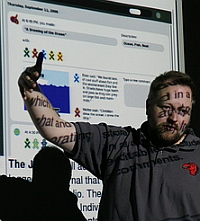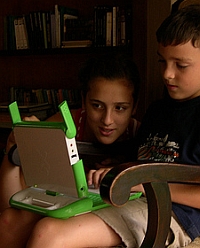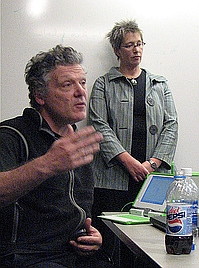My name is Christoph Derndorfer and you might remember me from my earlier comments about OLPC videos at CES and Sugar user interface testing. Now while I'm on a train racing through the night to Hannover, Germany where I'll be attending CeBIT I finally had time to read through some very interesting notes taken during a recent presentation by Christopher Blizzard.
Blizzard was speaking during the NY Linux User's Group monthly meeting which was held at Google's offices in New York City. Unfortunately I haven't been able to find out who wrote that summary but the person certainly had some outstanding note-taking skills! Anyway, I'll be highlighting some key-aspects that I found to be interesting and which at least I previously hadn't heard about.
"With regard to issues involved in designing for kids: [Christopher Blizzard] admits they are doing something new and it may not work."This is indeed very interesting. While Wayan Vota and many other smart people have been discussing the pro's and con's of OLPC's approach to education and design for a long time this appears to be the first incident of an OLPC key member admitting that their approach is indeed something completely new that "may not work".
If you've been reading or hearing some of the comments made by Nicholas Negroponte one might end up believing that OLPC's approach is just a great as sliced bread. If not better! 100% guaranteed!! Maybe this will trigger a broader discussion about the OLPC initiatives goals, methods and tools. Even though I'm not holding my breath.
"Tech support? Kids should be ale to do it themselves or just replace the machine at $150. Designed so it can be fixed but at that pricepoint you may not need to."Assuming that this paragraph details Christopher's reply to an audience question about tech support, I have to admit that the answer took me by surprise. Is he really suggesting that 8-year olds fix their own OLPC XOs when they run into issues? I mean honestly, how many 8-year olds in the Western world (who have been exposed to technology for all their lives) are able to fix their systems?
While my 13-year old brother is very much capable of using Google to find information, purchase things of Amazon and read reviews about digital cameras it's still me who's setting up, repairing and maintaining his computer. To consider it a realistic option for 8-year olds to do that is utter nonsense in my opinion. But again, maybe I'm just misinterpreting that paragraph.
"Journal replaces a file system. Visibility of an item helps remind how current it is. There is a 1/2 gig of storage. The model is one of working with a full hard drive at all times where older items naturally fall off."Now that's an interesting comment for two reasons. First of all because it contradicts OLPC's goal to make the system understandable by using mental models that are found in many different cultures. Now I've never kept a journal myself but I'm honestly not aware of any journals that toss out information once you've recorded it.
Per definition a journal is used to keep and record memories, until you decide to get rid of them. You decide what's kept and what ends up in the trash can! Secondly this is of course a technical limitation of the Children's Machine XO machines. 512MB memory is actually more than it sounds (once you forget about high-def videos, torrents and Vista) in terms of storage for text, sounds and pictures. However if you consider the fact that these systems will be in use for several years then 512MB (minus the requirements for the included software) isn't all that much.
So yes, from a purely technical standpoint it makes sense to use the tried-and-trusted FIFO (first-in, first-out) approach for the journal. From a user-perspective things are a little different. I'm sure that each person reading these lines has a multitude of files on his/her computer that they haven't used, viewed or changed in a very long time. But we still keep them for a variety of reasons.
I for one could never imagine loosing all those crazy party photos taken when me and friends were 16. I may not look at them on a regular basis - much less show them to anyone else - but I'm happy to know that they're right there on my hard-drive. The journal is an attempt to simply the abstract concept of a file-system. However this doesn't sound like a good approach.
"Also, laptops will be dropped off with a person who will train local people for about a month about the mouse, frame, zoom and interaction."Again, I'm not aware of previous comments detailing this aspect. There have been many questions raised on the topic of training for potential OLPC X0 users, this might be the first glimpse at how OLPC plans to do that.
"One of the words Christopher used to describe working on the project was creepy... I asked if he meant because it was such a large idea that can have an impact? He said not exactly. Maybe it has to do with an earlier comment he made about being a bunch of geeky tech guys who have no notion of the environment these machines will go into on a personal level."Via his blog Christopher Blizzard later clarified that he
"said 'creepy' because it felt strange being in the middle of such an amazing group of people and trying to do something as amazing as this. You spend a lot of time beside yourself when you’re working on this project. It’s like watching some insane version of yourself from the outside."It's nevertheless interesting that the guy taking these notes interpreted that phrase the way he did. This 'having little idea about the environment these machines will do into' is another aspect that many people have criticized or at least questioned about the OLPC project.
Can a bunch of well-educated Western computer and technology geeks working in fancy offices really come up with a solution for the developing world? Well, I guess that depends on whether you believe that OLPC is a laptop project or an education project.





I find it interesting that you assumed I was a guy.
I want to respond to some of your comments on my notes and I hope I don't misrepresent Chrostopher Blizzard or OLPC in the process.
With regard to Christopher admitting Sugar and the project are something that might not work - I think you are making too much out of it. They are doing something new. It would be arrogant to assume 100% success in this endeavor though I hope they get as close as possible. I think this is a humble tech guy with an unassuming way of speaking, the antithesis of someone out as a marketing guy.
The comment about eight year olds was in response to a roomful of people many of whom took apart their toys as a kid just to put them back together (One audience member specifically described this.). The presumption was the existence of similar kids and noting issues of scalability as well was in the general vicinity of the comment. Mostly, it seemed like laptops would be replaced if anything.
With regard to the journal it is an interesting model meant to make use of the limits of space.
In that you are able to be online there would be no reason kids involved wouldn't be able to use gmail to quadruple their space or some other way of storing files online if archiving became something they wanted to do. I personally keep too much crap, I think the idea is quite interesting.
My interpretation of creepy came from a comment from Christopher Blizzard. Again I think it would be arrogant to be someone with a home, food, controlled climate and not have some doubts about going into a developing region with issues you have never had to deal with and assume you know everything. I would rather be in a world where people try to do what they can while honestly assessing what they know and don't know and being able to publically voice this.
Yaffa wrote:
>>>
Again I think it would be arrogant to be someone with a home, food, controlled climate and not have some doubts about going into a developing region with issues you have never had to deal with and assume you know everything. I would rather be in a world where people try to do what they can while honestly assessing what they know and don't know and being able to publically voice this.>>>>
I wish Negroponte could agree with this :-)
There are many assumptions about the assumptions implied by doing what Blizzard | Bender | Negroponte | Jepson | Papert | others think they are doing.
Again, it is not correct to assume they know nothing about sub-Sahahan Africa or what happens to a PC in that environment -- or better yet, what happens to an Ivorian kid, who speaks primarily French, when she sits down in front of a machine for the first time.
These olpc people have been in these environments for extended periods of time with computing. The image of Noblesse Oblige many people express about OLPC and again expressed above is quite inaccurate.
Nicholas in many of his presentations (the one I heard was his Keynote address at LinuxWorld in Boston in Jan 2006) describes what does happen to one of these kids: she sits down, turns it on, throws the manual (written in English) over her shoulder and starts using the machine.
The commentary on this site has improved in balance over time, but the many people expressing negativity-without-basis (versus Criticism) will be shocked to learn the depth of thought and experience that underpins the design of this education project.
I urge people to spend time following links from http://www.laptop.org with an open mind before commenting.
I find it curious that those who say the Laptop will fail do so with great assurance, regardless of what OLPC does or says, while those who think it will succeed admit to ignorance about how that will be achieved. The naysayers and doomcriers will interpret this as evidence for the expected disaster, while the boosters say, "Of course we don't know how it will all work. We only have a few field experiments to go on. The point is that it will work well enough to start with, and then we can make it work better."
Why do some people take an admission of ignorance as a sign of incompetence? In actual research, it is only those who understand our collective ignorance in the deepest way who can make any progress against it. Lord Kelvin thought in the 1890s that physics was just about wrapped up except for measuring a few more decimal places, although there were a few niggles such as the Ultraviolet Catastrophe and the perihelion of Mercury. Those two niggles turned out to be the starting points for Quantum Mechanics and General Relativity, two whole new branches of physics which have not yet been exhausted.
Now as I read the notes, Blizzard said that he didn't know whether they had the best design for kids (as in the new Sugar user interface), not that he had doubts about the project as a whole.
No, he did not suggest that every 8-year-old could learn to fix these laptops. He said that a few might. I would bet money that every school in the program turns out at least one 12- or 13-year-old who can fix the laptops, and that those children will have good careers set for them before graduation. How many more do you need than one or two per school?
You don't like the rolling event log model proposed for the kids' journals. You want them to be able to save everything. OK, show us the design, and the money to pay for it. You don't get to complain that the best thing ever seen in these countries is somehow not good enough.
Yeah, we aren't going to get a perfect computer out of this project. You show me a perfect computer somewhere else and I will concede that we should be building those for the schoolchildren. In the real world it is obvious that no computer that humans will ever be able to build can be big enough or fast enough.
Geeks in fancy offices, you say? I got started with this sort of idea in the 1960s, when I was tutoring inner-city children during my college years, after I heard in Psych 101 that Prof. O. K. Moore had programmed an IBM 360 to teach two-year-olds to read and write. After graduation I went to Korea in the Peace Corps. Negroponte took his ideas and his computers to Cambodia. Based on my experiences with Korean children, and the accounts of many other programs providing computers to children, I believe him when he says that children throw the manual away and start right in.
Where have you gone, Christoph? Where is your credibility supposed to come from? Or are you just another geek in a not-so-fancy office?
To me, this is like trials of some new medicine where the results are so good that the trial has to be stopped on ethical grounds, and all participants who were on the placebo are given the real medicine. And they don't wait to publish the results in the journals before they get on with it. Cambodia plus Maine and Georgia is substantial evidence. It would be equally unethical for the OLPC researchers to wait for publication and complete public understanding before rolling out the program worldwide, given the levels of death from common diseases that could easily be prevented with elementary health education.
Cherlin wrote:
>>>
To me, this is like trials of some new medicine where the results are so good that the trial has to be stopped on ethical grounds, and all participants who were on the placebo are given the real medicine.
>>>
Where is the equivalent OLPC "trial"? They are giving the medicine to everyone from the beginning, skipping the "placebo for some" ("trial") stage.
>>>>
And they don't wait to publish the results in the journals before they get on with it.
>>>
And they don't sell the medicine ("laptop") until the testing is done.
>>>>
Cambodia plus Maine and Georgia is substantial evidence.
>>>
Really? Care to provide legitimate links to this "evidence"?
>>>>
It would be equally unethical for the OLPC researchers to wait for publication and complete public understanding before rolling out the program worldwide, given the levels of death from common diseases that could easily be prevented with elementary health education.
>>>
So, now the laptop is a "health project" too?